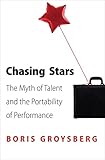Chasing Stars : The Myth of Talent and the Portability of Performance / Boris Groysberg.
Material type: TextPublisher: Princeton, NJ : Princeton University Press, [2010]Copyright date: ©2010Edition: Course BookDescription: 1 online resource (504 p.) : 13 line illus. 18 tablesContent type:
TextPublisher: Princeton, NJ : Princeton University Press, [2010]Copyright date: ©2010Edition: Course BookDescription: 1 online resource (504 p.) : 13 line illus. 18 tablesContent type: - 9780691154510
- 9781400834389
- online - DeGruyter
- Issued also in print.
| Item type | Current library | Call number | URL | Status | Notes | Barcode | |
|---|---|---|---|---|---|---|---|
 eBook
eBook
|
Biblioteca "Angelicum" Pont. Univ. S.Tommaso d'Aquino Nuvola online | online - DeGruyter (Browse shelf(Opens below)) | Online access | Not for loan (Accesso limitato) | Accesso per gli utenti autorizzati / Access for authorized users | (dgr)9781400834389 |
Browsing Biblioteca "Angelicum" Pont. Univ. S.Tommaso d'Aquino shelves, Shelving location: Nuvola online Close shelf browser (Hides shelf browser)

|

|

|

|

|

|

|
||
| online - DeGruyter Pen of Iron : American Prose and the King James Bible / | online - DeGruyter Capitalism and the Jews / | online - DeGruyter The Wind from the East : French Intellectuals, the Cultural Revolution, and the Legacy of the 1960s / | online - DeGruyter Chasing Stars : The Myth of Talent and the Portability of Performance / | online - DeGruyter A Short History of Celebrity / | online - DeGruyter Climate Change Justice / | online - DeGruyter How Enemies Become Friends : The Sources of Stable Peace / |
Frontmatter -- Contents -- Acknowledgments -- Introduction -- Part One. Talent and Portability -- 1. Moving On -- 2. Analysts' Labor Market -- 3. The Limits of Portability -- 4. Do Firms Benefit from Hiring Stars? -- Part Two. Facets of Portability -- 5. Stars and Their Galaxies: Firms of Origin and Portability -- 6. Integrating Stars: The Hiring Firm and Portability of Performance -- 7. Liftouts (Taking Some of It with You): Moving in Teams -- 8. Women and Portability: Why Is Women's Performance More Portable than Men's? -- Part Three. Implications for Talent Management: Developing, Retaining, and Rewarding Stars -- 9. Star Formation: Developmental Cultures at Work -- 10. Turnover: Who Leaves and Why -- 11. A Special Case of Turnover Stars as Entrepreneurs -- 12. Measuring and Rewarding Stars' Performance -- 13. Lessons from Wall Street and Elsewhere -- Appendix -- Notes -- Notes
restricted access online access with authorization star
http://purl.org/coar/access_right/c_16ec
It is taken for granted in the knowledge economy that companies must employ the most talented performers to compete and succeed. Many firms try to buy stars by luring them away from competitors. But Boris Groysberg shows what an uncertain and disastrous practice this can be. After examining the careers of more than a thousand star analysts at Wall Street investment banks, and conducting more than two hundred frank interviews, Groysberg comes to a striking conclusion: star analysts who change firms suffer an immediate and lasting decline in performance. Their earlier excellence appears to have depended heavily on their former firms' general and proprietary resources, organizational cultures, networks, and colleagues. There are a few exceptions, such as stars who move with their teams and stars who switch to better firms. Female stars also perform better after changing jobs than their male counterparts do. But most stars who switch firms turn out to be meteors, quickly losing luster in their new settings. Groysberg also explores how some Wall Street research departments are successfully growing, retaining, and deploying their own stars. Finally, the book examines how its findings apply to many other occupations, from general managers to football players. Chasing Stars offers profound insights into the fundamental nature of outstanding performance. It also offers practical guidance to individuals on how to manage their careers strategically, and to companies on how to identify, develop, and keep talent.
Issued also in print.
Mode of access: Internet via World Wide Web.
In English.
Description based on online resource; title from PDF title page (publisher's Web site, viewed 30. Aug 2021)


